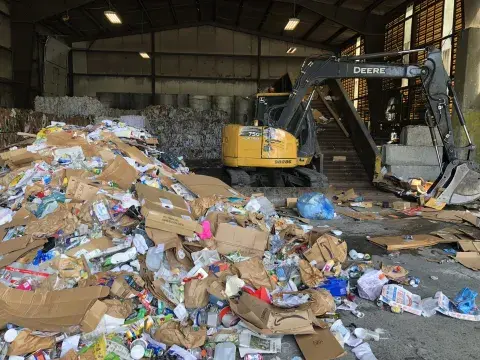
Last Friday, I received a troubling email from my colleague. She had been contacted by the manager of a New Hampshire transfer station. You know, what some people still refer to as the town dump. The transfer station manager had resigned his position because the town directed him to open his recycling building back up to residents despite the manager’s objections.
The facility has a drive-thru with close quarters, making it difficult to enforce social distancing. On the other hand, the town offices remain closed to ensure adequate social distancing.
The transfer station staff are all over the age of 70. The manager quit out of frustration for the inequity of what the town was asking of the transfer station staff.
We all know by now that transfer station staff provide essential services, during a pandemic or not. But did you know that in New Hampshire, solid waste operators must undergo a full-day basic training class and pass a written exam at the end in order to safely manage your trash and recycling? Did you know that they have annual continuing education requirements? Did you know that in many small communities, the transfer station is one of the few sources of town revenue?
I didn’t know that before becoming the executive director of the Northeast Resource Recovery Association (NRRA), a nonprofit that enables communities to manage their own recycling programs throughout New England.
Since joining NRRA last June, I have spent considerable time traveling throughout New England to visit some of our over 400 members. I have witnessed the quiet pride recycling managers have for their facilities. I have also witnessed the quiet pain that some operators carry after being shown in so many small ways that they are at the bottom of the totem pole compared to other town staff.
For example, consider the manager who is paid comparably to secretarial staff at the town office. This same manager oversees a budget of several hundred thousand dollars, supervises other staff, watches recycling market pricing like a hawk, educates residents about where their recycling is going and, on top of all that, deals diplomatically with frustrated residents who gripe about paying $10 to dispose of a couch.
Fortunately, I also know solid waste managers who are respected and held in high regard in their communities. But sadly, that is the exception, not the rule.
Did you know that there are still transfer stations in New England without running water or bathrooms for staff? Recently, I heard from a transfer station manager who has had several COVID-19 confirmed residents visit the transfer station when they should have been quarantined at home. What about the safety of the transfer station staff? This type of inequity particularly stings during times like this, when solid waste operators are expected to carry on business as usual during a pandemic.
On April 15, NRRA held a free webinar on the best management practices for recycling facilities during COVID-19. It featured a question-and-answer format with Dr. Ben Locwin, an expert in infectious disease epidemiology, and shared how communities can take steps to manage trash and recycling as safely as possible during the pandemic. The response was overwhelming: Over 300 participants attended the webinar live, and over 150 have now watched the webinar recording. I was humbled by the avalanche of positive feedback we received afterward from attendees, who joined us from throughout the Northeast.
Why was this webinar so well received? Certainly, it shared vital information at a time of great uncertainty. But I suspect it also struck a chord with recycling facility staff because it was designed just for them, which demonstrated that we recognized our solid waste operators for what they are – quiet heroes in this pandemic.
Managing people’s trash and recycling is only a small part of what solid waste operators do every day.
They cultivate the social gathering spot that is your local transfer station. They prioritize the environment through responsible and sustainable recycling and reuse (which is less glamorous than purchasing the latest eco-friendly product). They help residents who need assistance with the disposal of their trash and recycling. They work in all kinds of weather throughout the year. They are doing incredible work to support our communities during this challenging time.
They did not enter this line of work to achieve public recognition, yet I suspect these quiet heroes might appreciate a quiet thank you.
The next time you visit your local transfer station, please join me in thanking our solid waste operators.
(Reagan Bissonnette is the executive director of the Northeast Resource Recovery Association.)
Originally published in the Concord Monitor and later republished in the New Hampshire Union Leader.
